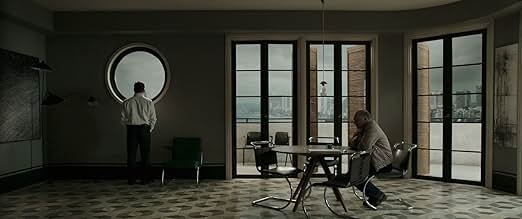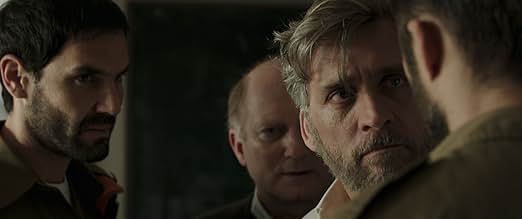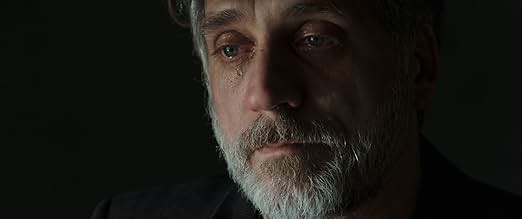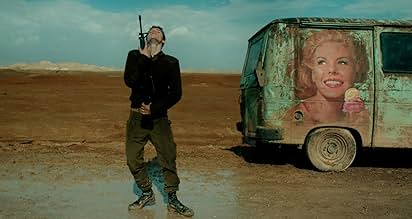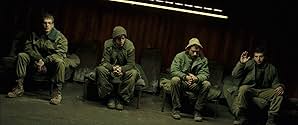IMDb RATING
7.2/10
8.3K
YOUR RATING
A troubled family must face the facts when something goes terribly wrong at their son's desolate military post.A troubled family must face the facts when something goes terribly wrong at their son's desolate military post.A troubled family must face the facts when something goes terribly wrong at their son's desolate military post.
- Awards
- 21 wins & 25 nominations total
Yonatan Shiray
- Jonathan
- (as Yonathan Shiray)
Itay Exlroad
- Dancer Soldier
- (as Etay Axelroad)
Arie Tcherner
- High Ranking Officer
- (as Aryeh Cherner)
- Director
- Writer
- All cast & crew
- Production, box office & more at IMDbPro
Featured reviews
Part satirical allegory, part surrealist indictment, Foxtrot finds writer/director Samuel Maoz working with similar themes as he did in Lebanon (2009); the ridiculous nature of war, the desensitisation of youth during wartime, the futility and meaninglessness of giving one's life in the service of one's country. However, whereas Lebanon was set during the 1982 Lebanon War, and shot entirely from inside a Centurion tank, Foxtrot is set in the present day, and expands Moaz's thematic concerns to take in the grief and anguish of those who have lost children to military service. Much like Lebanon, Foxtrot is an intensely political film, and much like Lebanon, Foxtrot has met with controversy and condemnation in Maoz's native Israel. Whereas Lebanon was accused of attempting to dissuade young men from joining the Israel Defense Forces (IDF), Foxtrot has been attacked for slandering the moral character of the IDF. A meditative and contemplative piece, heavy on metaphors, for the most part, the film hinges on non-action and passivity - the characters don't so much drive events, as events happen to them. Indeed, this is another of the film's themes - our inability to control fate (or, depending on your outlook, random chance). As with Lebanon, Maoz displays extraordinary technical proficiency and control of the medium, with the film as aesthetically impressive as it is politically divisive. A savage condemnation of both a national psyche and a military mindset that trades on the most binary of them-versus-us dichotomies and consciously strives to blur the line between personal honour and political ideology, Foxtrot is not always an easy watch, and it's rarely what you would call "entertaining", but it's undeniably a brilliantly made and deeply passionate film.
Divided into three distinct sections, the film tells the story of Michael Feldman (a superb Lior Ashkenazi), who receives word that his son Jonathan, a conscript in the IDF, has been killed "in the line of duty". Devastated, he begins to ask questions - how was Jonathan killed, where was he stationed, is there a body - none of which are met with a straight answer. However, several hours later, Michael and his wife Dafna (Sarah Adler) are told Jonathan is still alive; a Jonathan Feldman was killed, but it was a different Jonathan Feldman. The film then jumps several days back to a forlorn desert checkpoint on Israel's northern border (codename Foxtrot) manned by a group of wet-behind-the-ears soldiers, including Jonathan Feldman (Yonatan Shiray). The most action the group see is raising the barrier to let a camel amble through and checking the IDs of the few Palestinians who pass by. Indeed, they are more interested in the fact that the shipping container in which they sleep is slowly sinking into the sand than in anything military-related. However, when a mistake whilst checking the IDs of a group of Palestinians leads to tragedy, Jonathan comes to learn just how ruthlessly political the IDF can be. Without spoiling anything, the third section, which is kind of an extended coda, then returns to Michael and Dafna's apartment, six months after the opening scenes.
In Foxtrot, Maoz constructs an allegory through which he deconstructs Israeli national myths and self-aggrandising narratives. Interrogating what he sees as a culture of denial born from a reluctance to deal with the morality and sustainability of being an occupying force, the film gets a lot of mileage out of the metaphor of the foxtrot - a dance where no matter where you go, if you follow the steps correctly, you end up back at the starting position. Applied to Israel, or indeed, any nation, Maoz is suggesting that without taking great care, countries will repeat the errors of the past, ending up exactly where they once were. The film depicts three generations of Feldmans (Michael's mother (Karin Ugowski), a Holocaust survivor now suffering from dementia, Michael himself, and Jonathan) dancing the foxtrot (literally in Michael and his mother's cases), either unwilling or unable to face up to the country's violent and traumatic past. Speaking to the Globe and Mail, Maoz explains, "Foxtrot deals with the open wound or bleeding soul of Israeli society. We dance the foxtrot; each generation tries to dance it differently but we all end up at the same starting point", whilst he tells the LA Times, "the roadblock is a microcosm of a society - any society - that has its perception distorted by a past trauma."
In a more concrete sense, in two scenes at Foxtrot, the film examines the casual sadism, unspoken racism, and braggadocious machoism that can arise from serving in the armed forces of a country perpetually at war. In the first (arguably the best scene in the film), the soldiers make a Palestinian couple stand in the pouring rain whilst their antiquated computer checks the couple's IDs. Obviously dressed for a formal night (he is in a tuxedo, she in an elegant dress), by the time the soldiers clear them to pass, their clothes are destroyed, as is her hair, and her makeup is ruined, with the soldiers even making her empty the contents of her purse onto the ground. The scene is brilliantly staged, agonisingly realistic, and takes place in real-time, with Maoz concentrating on the couple looking at one another across the roof of the car, conveying agonised helplessness, compromised innocence, understandable belligerency, and, most saliently, abject humiliation. It's a masterclass in dialogue-free storytelling, and deeply political storytelling at that. In the second scene, the soldiers act with violent impunity against a car of young Palestinians, although the act of violence itself arises from a mistake.
Aesthetically, as with Lebanon, Foxtrot is fascinatingly staged. For starters, Maoz shoots each of the three sections differently, but in ways tightly tied to their thematic focus; the first is highly restrictive, trapping us in the confined ideological headspace of the Feldmans, with the intense emotionality constantly threatening to boil over; the vast wide-open vistas of the second part contrast sharply with the confinement of the first, with the entire section threaded through with surrealism and even a hint of magic realism; the third section is darker than the others (in a literal sense), with a stark visual design that emphasises only those elements that are important to the scene. The Feldman apartment itself is extremely angular, and although it's very spacious, cinematographer Giora Bejach shoots it in such a way as to appear oppressively box-like. Indeed, boxes are emphasised throughout the film; the floor pattern of the Feldman living room, the container in which the soldiers at Foxtrot sleep, the dance moves of the foxtrot itself. The impression given is that the characters are fundamentally trapped - in a practical sense by the boxes with which they've surrounded themselves, and in a more metaphorical sense by the nation's psyche.
Foxtrot certainly won't be for everyone. Some will take issue with the pacing (which, it has to be said, is extremely languid), some with the allegorical nature of the story, some with the film's politics. For everyone else, however, this is a brilliantly realised family tragedy, dealing with the randomness of pain and loss in a country refusing to recognise its past. Maoz tells a personal story, but he also exposes the nature of a country whose moral crisis is no less severe than the crisis in which the Feldmans find themselves. Critiquing the practice of sending soldiers to die for absolutely nothing, as well as the xenophobic mindset that has crept into the Israeli zeitgeist, Maoz has been accused of making an "anti-Israel narrative." On the contrary, he is pleading with his country to change its ways, or it will repeat the errors of history; this is the act of a man who loves his country deeply, but who can see its flaws. In one of the most devastatingly heartbreaking lines I've heard in a long time, Dafna muses, "I remember thinking that I was going to be happy." Maoz is suggesting so too did the Israeli people.
Divided into three distinct sections, the film tells the story of Michael Feldman (a superb Lior Ashkenazi), who receives word that his son Jonathan, a conscript in the IDF, has been killed "in the line of duty". Devastated, he begins to ask questions - how was Jonathan killed, where was he stationed, is there a body - none of which are met with a straight answer. However, several hours later, Michael and his wife Dafna (Sarah Adler) are told Jonathan is still alive; a Jonathan Feldman was killed, but it was a different Jonathan Feldman. The film then jumps several days back to a forlorn desert checkpoint on Israel's northern border (codename Foxtrot) manned by a group of wet-behind-the-ears soldiers, including Jonathan Feldman (Yonatan Shiray). The most action the group see is raising the barrier to let a camel amble through and checking the IDs of the few Palestinians who pass by. Indeed, they are more interested in the fact that the shipping container in which they sleep is slowly sinking into the sand than in anything military-related. However, when a mistake whilst checking the IDs of a group of Palestinians leads to tragedy, Jonathan comes to learn just how ruthlessly political the IDF can be. Without spoiling anything, the third section, which is kind of an extended coda, then returns to Michael and Dafna's apartment, six months after the opening scenes.
In Foxtrot, Maoz constructs an allegory through which he deconstructs Israeli national myths and self-aggrandising narratives. Interrogating what he sees as a culture of denial born from a reluctance to deal with the morality and sustainability of being an occupying force, the film gets a lot of mileage out of the metaphor of the foxtrot - a dance where no matter where you go, if you follow the steps correctly, you end up back at the starting position. Applied to Israel, or indeed, any nation, Maoz is suggesting that without taking great care, countries will repeat the errors of the past, ending up exactly where they once were. The film depicts three generations of Feldmans (Michael's mother (Karin Ugowski), a Holocaust survivor now suffering from dementia, Michael himself, and Jonathan) dancing the foxtrot (literally in Michael and his mother's cases), either unwilling or unable to face up to the country's violent and traumatic past. Speaking to the Globe and Mail, Maoz explains, "Foxtrot deals with the open wound or bleeding soul of Israeli society. We dance the foxtrot; each generation tries to dance it differently but we all end up at the same starting point", whilst he tells the LA Times, "the roadblock is a microcosm of a society - any society - that has its perception distorted by a past trauma."
In a more concrete sense, in two scenes at Foxtrot, the film examines the casual sadism, unspoken racism, and braggadocious machoism that can arise from serving in the armed forces of a country perpetually at war. In the first (arguably the best scene in the film), the soldiers make a Palestinian couple stand in the pouring rain whilst their antiquated computer checks the couple's IDs. Obviously dressed for a formal night (he is in a tuxedo, she in an elegant dress), by the time the soldiers clear them to pass, their clothes are destroyed, as is her hair, and her makeup is ruined, with the soldiers even making her empty the contents of her purse onto the ground. The scene is brilliantly staged, agonisingly realistic, and takes place in real-time, with Maoz concentrating on the couple looking at one another across the roof of the car, conveying agonised helplessness, compromised innocence, understandable belligerency, and, most saliently, abject humiliation. It's a masterclass in dialogue-free storytelling, and deeply political storytelling at that. In the second scene, the soldiers act with violent impunity against a car of young Palestinians, although the act of violence itself arises from a mistake.
Aesthetically, as with Lebanon, Foxtrot is fascinatingly staged. For starters, Maoz shoots each of the three sections differently, but in ways tightly tied to their thematic focus; the first is highly restrictive, trapping us in the confined ideological headspace of the Feldmans, with the intense emotionality constantly threatening to boil over; the vast wide-open vistas of the second part contrast sharply with the confinement of the first, with the entire section threaded through with surrealism and even a hint of magic realism; the third section is darker than the others (in a literal sense), with a stark visual design that emphasises only those elements that are important to the scene. The Feldman apartment itself is extremely angular, and although it's very spacious, cinematographer Giora Bejach shoots it in such a way as to appear oppressively box-like. Indeed, boxes are emphasised throughout the film; the floor pattern of the Feldman living room, the container in which the soldiers at Foxtrot sleep, the dance moves of the foxtrot itself. The impression given is that the characters are fundamentally trapped - in a practical sense by the boxes with which they've surrounded themselves, and in a more metaphorical sense by the nation's psyche.
Foxtrot certainly won't be for everyone. Some will take issue with the pacing (which, it has to be said, is extremely languid), some with the allegorical nature of the story, some with the film's politics. For everyone else, however, this is a brilliantly realised family tragedy, dealing with the randomness of pain and loss in a country refusing to recognise its past. Maoz tells a personal story, but he also exposes the nature of a country whose moral crisis is no less severe than the crisis in which the Feldmans find themselves. Critiquing the practice of sending soldiers to die for absolutely nothing, as well as the xenophobic mindset that has crept into the Israeli zeitgeist, Maoz has been accused of making an "anti-Israel narrative." On the contrary, he is pleading with his country to change its ways, or it will repeat the errors of history; this is the act of a man who loves his country deeply, but who can see its flaws. In one of the most devastatingly heartbreaking lines I've heard in a long time, Dafna muses, "I remember thinking that I was going to be happy." Maoz is suggesting so too did the Israeli people.
As others have pointed out, this is a 3-act film. Act 1 provides a chilling view of the military precision of the Israeli military's process for informing a family of a tragedy. Act 2 provides a view of Foxtrot outpost, a checkpoint guarding some deserted road. There is the general boredom, combined with occasions of high anxiety, where any car to be checked could have suicide bombers. In Act 3, the family's unsuccessful attempt to see their son's body leads to more drama, with an ending that I consider too neat - hence my low score on the movie.
'Foxtrot' starts with officers telling Michael and Daphna Feldman their son Jonathan has been killed in the line of fire.
The film then spends quite a bit of time showing us how they battle to come to terms with the loss of their son. For a while, the film stagnates on their emotions, with some scenes lingering. The lack of musical score makes it all the more realistic and the actors does such a great job that we believe they actually lost a loved one.
Funeral arrangements are being made whilst the film still focuses heavily on Michael's emotions. If you're tempted to stop watching after this slow start, don't! In an instant, the film changes direction with an unexpected reveal. How do I even talk about 'Foxtrot' without doing spoilers? I want you to be just as surprised as I was and revealing what happens next will ruin the surprise.
But the film is not done with shock reveals. Just when you think everything is on track, 'Foxtrot' suddenly resorts to non-linear storytelling - another element I never saw coming that changes everything!
'Foxtrot' features fantastic performances, great cinematography, and a few moments that reminded me of a Wes Anderson film. A Few moments even had me laughing out loud! This is a very unusual film. It has a very simple premise, but it is so well executed. Oh, but that ending...
The film then spends quite a bit of time showing us how they battle to come to terms with the loss of their son. For a while, the film stagnates on their emotions, with some scenes lingering. The lack of musical score makes it all the more realistic and the actors does such a great job that we believe they actually lost a loved one.
Funeral arrangements are being made whilst the film still focuses heavily on Michael's emotions. If you're tempted to stop watching after this slow start, don't! In an instant, the film changes direction with an unexpected reveal. How do I even talk about 'Foxtrot' without doing spoilers? I want you to be just as surprised as I was and revealing what happens next will ruin the surprise.
But the film is not done with shock reveals. Just when you think everything is on track, 'Foxtrot' suddenly resorts to non-linear storytelling - another element I never saw coming that changes everything!
'Foxtrot' features fantastic performances, great cinematography, and a few moments that reminded me of a Wes Anderson film. A Few moments even had me laughing out loud! This is a very unusual film. It has a very simple premise, but it is so well executed. Oh, but that ending...
The theme 'war is absurd' has become a cliché that tests the creativity of many a filmmaker. How many ways can you represent the random chaos of shattered lives and senseless destruction? The emotional rollercoaster Foxtrot (2017) hits the high-watermark in originality for the way it deploys grief, social critique, and absurdism to show a different side of war.
The film's four acts defy the conventions of linear storytelling. In the opening seconds, a mother (Sara Adler) sees three soldiers at the door and before they can speak she collapses to the ground. With military precision, the doctor among them administers sedation and tells the father (Lior Askhkenazi) she will sleep for five hours; that's usual, they say. When a son has fallen in the line of duty they expect the father to cope. They leave; another comes to plan just another funeral; then alone, the father furiously paces like a caged beast, crushed by his own emotions. In five hours they return with totally different news.
That plotline alone could fill a movie, but it is merely the first step of an absurdist dance with chaos that goes forward, across, back, then returns to the beginning. In the second act we meet the very much alive son Jonathan (Yonaton Shiray) who is stationed on an isolated checkpoint where the only intruders are camels that have trained the guards to open the boom-gate to let them pass. Bored out of their minds, the four teenage warriors tell each other stories, punctuated by Jonathan's memorable foxtrot dance with his rifle as partner. The third and final acts complete this case study of random chaos; they include a scene one year later where the mother and father commiserate a tragedy and a dissolving marriage. The final seconds of the film match the opening in the way they erupt with the unexpected.
Undoubtedly, this film is anchored by the first 45 minutes in which Lior Askhkenazi gives a tour-de-force performance of going to hell and back. It is also a forensic satire that is beyond war clichés and that has infuriated the Israeli Military establishment. So much is being said in this film, with so few words spent. Small moments are jarring: like a father being told casually that his fallen son was promoted posthumously, as if he is worth more dead than alive, or the mechanically detailed way the military deals with death and bereavement. The camerawork and colour palette superbly set the mood of each act, and the asymmetry of the narrative reflects an alternative and absurdist universe in which war is normalised.
This is powerful cinema, the kind that can sweep you up with its characters, emotions, and story. Then, at the end of the film when the dance is done, you are left in disbelief at the banality of humanity. Watch for Foxtrotin Best Foreign Film award.
The film's four acts defy the conventions of linear storytelling. In the opening seconds, a mother (Sara Adler) sees three soldiers at the door and before they can speak she collapses to the ground. With military precision, the doctor among them administers sedation and tells the father (Lior Askhkenazi) she will sleep for five hours; that's usual, they say. When a son has fallen in the line of duty they expect the father to cope. They leave; another comes to plan just another funeral; then alone, the father furiously paces like a caged beast, crushed by his own emotions. In five hours they return with totally different news.
That plotline alone could fill a movie, but it is merely the first step of an absurdist dance with chaos that goes forward, across, back, then returns to the beginning. In the second act we meet the very much alive son Jonathan (Yonaton Shiray) who is stationed on an isolated checkpoint where the only intruders are camels that have trained the guards to open the boom-gate to let them pass. Bored out of their minds, the four teenage warriors tell each other stories, punctuated by Jonathan's memorable foxtrot dance with his rifle as partner. The third and final acts complete this case study of random chaos; they include a scene one year later where the mother and father commiserate a tragedy and a dissolving marriage. The final seconds of the film match the opening in the way they erupt with the unexpected.
Undoubtedly, this film is anchored by the first 45 minutes in which Lior Askhkenazi gives a tour-de-force performance of going to hell and back. It is also a forensic satire that is beyond war clichés and that has infuriated the Israeli Military establishment. So much is being said in this film, with so few words spent. Small moments are jarring: like a father being told casually that his fallen son was promoted posthumously, as if he is worth more dead than alive, or the mechanically detailed way the military deals with death and bereavement. The camerawork and colour palette superbly set the mood of each act, and the asymmetry of the narrative reflects an alternative and absurdist universe in which war is normalised.
This is powerful cinema, the kind that can sweep you up with its characters, emotions, and story. Then, at the end of the film when the dance is done, you are left in disbelief at the banality of humanity. Watch for Foxtrotin Best Foreign Film award.
I am not sure why, but there's just something about this movie that brings warmth to my heart. I can't say that there's something inherently unique about its message, but the way that it communicated it really resonated with me. There is no evil in this film that causes pain to characters but rather just unfortunate events. And it's not someone's fault too. I think that this is a movie about the unnecessary suffering that we all have to live through. This message is often delivered with unnecessary pretentiousness and I was happy to feel none in this film.
There were a couple of lines that felt unnecessary, but it is because the whole movie is quite subtle and communicates a lot without words so these lines felt out of place.
The cinematography is also great, although it is not something I often draw attention to. Oh, and the acting is absolutely stellar, especially one of the father, I couldn't take my eyes off his performance.
I am upset that nobody I know saw this movie but I sure will recommend it to as many people as possible from now on so it gets credit it deserves.
There were a couple of lines that felt unnecessary, but it is because the whole movie is quite subtle and communicates a lot without words so these lines felt out of place.
The cinematography is also great, although it is not something I often draw attention to. Oh, and the acting is absolutely stellar, especially one of the father, I couldn't take my eyes off his performance.
I am upset that nobody I know saw this movie but I sure will recommend it to as many people as possible from now on so it gets credit it deserves.
Did you know
- TriviaAccording to Samuel Maoz, the film was conceived as three episodes: The first sequence should shock and shake, the second should hypnotize, and the third should be moving.
- ConnectionsReferences Qui veut la peau de Roger Rabbit (1988)
- SoundtracksNever Been
Performed by Betzefer
- How long is Foxtrot?Powered by Alexa
Details
- Release date
- Countries of origin
- Official sites
- Languages
- Also known as
- 今天跳舞不打仗
- Filming locations
- Production companies
- See more company credits at IMDbPro
Box office
- Gross US & Canada
- $618,883
- Opening weekend US & Canada
- $31,629
- Mar 4, 2018
- Gross worldwide
- $1,356,159
- Runtime1 hour 53 minutes
- Color
- Sound mix
- Aspect ratio
- 2.35 : 1
Contribute to this page
Suggest an edit or add missing content



